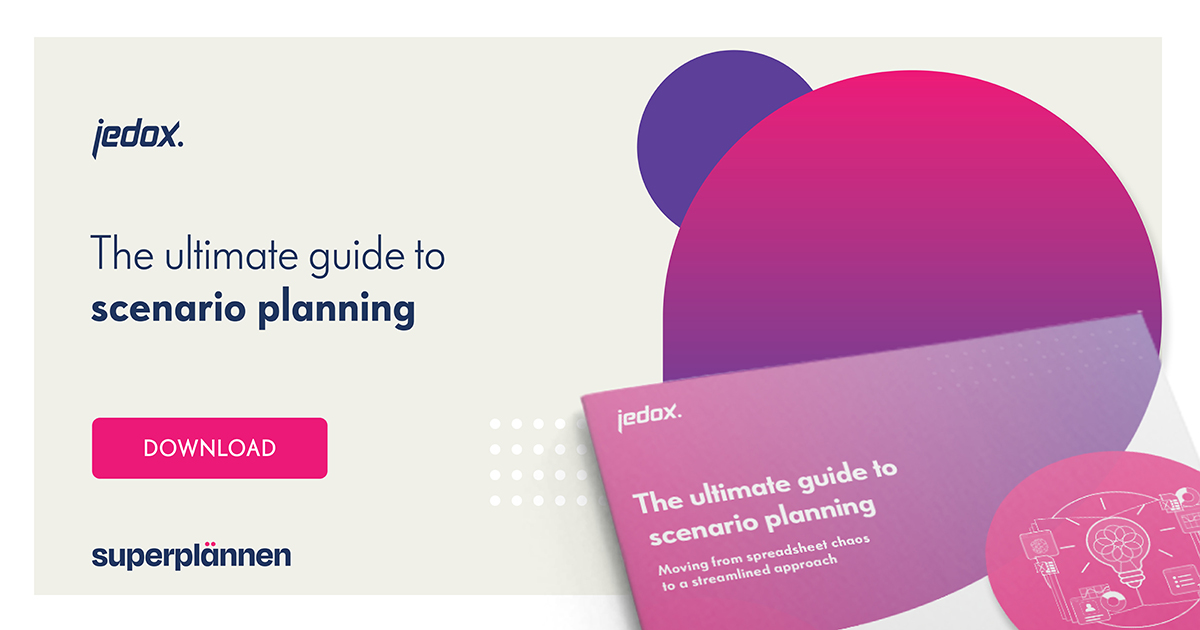
10 tips for a powerful scenario planning process
As macroeconomic factors continue to disrupt the market, finance teams face mounting pressure to proactively anticipate and prepare for potential events rather than reacting to events as they unfold. This future-ready approach involves evaluating multiple scenarios and making confident decisions that enable organizations to adapt and thrive in times of uncertainty. Scenario planning improves decisiveness in a volatile, uncertain, complex, and ambiguous (VUCA) world by providing a structured approach to view different ways the future may unfold based on current trends and assumptions.
From data relevance to digital twins, these ten tips will empower finance teams to establish a robust scenario planning process, uncover opportunities, and make confident decisions.
1. Focus on relevant information
In the vast sea of available data and variables, it is important to recognize that not all information is relevant to scenario planning. Finance teams may need to apply various statistical methods, such as regression, to evaluate how relevant the data is for the model. By distinguishing between relevant and extraneous factors, teams can focus their efforts on the most impactful variables and streamline the scenario planning process.
2. Involve diverse stakeholders
Scenario planning empowers organizations to prepare for several potential outcomes based on what they think may happen, which requires multiple perspectives and rich insights. Involve a diverse team of stakeholders who bring a range of perspectives, experiences, and expertise to ensure that all relevant factors are considered and potential gaps are identified. This approach creates more robust scenarios, encourages cross-organizational collaboration, and fosters continuous learning.
3. Recognize that the world is interdependent and random
Consider the interconnectedness of the world and the interplay between different variables that impact strategies and plans. Factors that may initially appear isolated can have ripple effects across the organization. By examining the relationships between variables, finance teams can gain a deeper understanding of the complexities inherent in the business environment. Additionally, embrace the inherent randomness that characterizes the business landscape. Rather than relying solely on deterministic approaches, incorporate probabilities into scenarios or utilize techniques such as Monte Carlo simulations to analyze a distribution of potential outcomes. By acknowledging and quantifying uncertainty, organizations can make informed decisions that account for a wide range of possibilities.
4. Develop internally consistent scenarios
Ensure that each scenario is internally consistent and logically coherent, and that it represents a plausible and distinct future to avoid conflicting assumptions or contradictory outcomes. Internal consistency enhances the credibility and usefulness of the scenarios, providing a solid foundation for confident decision-making. When scenarios are reliable and consistent, organizations can depend on them to navigate uncertainty and take decisive action.
5. Expect irregular distribution
Averaging out a high, medium, and low is not a reliable method to create a unified outlook, because inputs and outcomes do not typically follow a normal distribution. Instead, seek the most appropriate distribution pattern for each data source and apply heuristic judgment around forecasted numbers. This nuanced approach enables finance teams to capture the complexities and realities of the business environment more accurately.
6. Challenge assumptions and biases
Encourage team members to challenge their assumptions and biases to ensure that all perspectives and potential outcomes are considered. By fostering an environment where different perspectives are valued and constructive skepticism is welcomed, teams can avoid falling into the trap of groupthink and consider a wider range of potential outcomes. Embracing diversity cultivates an inclusive environment, stimulates innovation, and creates a richer scenario planning process.
7. Develop adaptable strategies
Scenarios can rapidly shift in a VUCA world. To navigate an ever-evolving business landscape, finance teams must develop adaptable plans that enable organizations to effectively respond to changing circumstances. By anticipating potential changes, organizations can respond quickly to any situation that may arise. This future-ready approach empowers organizations to build resilience, uncover opportunities, and simplify planning in a rapidly changing business landscape. With a scenario planning software it is easy to create multiple scenarios in no time and focus on developing strategies.
8. Monitor and update regularly
Scenario planning is not a one-time exercise but an ongoing process. Continuously monitor the business and the external environment for changes, and update scenarios and strategies regularly to ensure they remain relevant and effective over time. Analyze the outcomes of different scenarios and ask: Were some scenarios better than others? If so, why? This helps teams strive for continuous improvement and apply critical thinking to refine strategies for long-term success.
9. Explore technologies
Scenario planning is a rigorous process that demands significant effort from finance teams as they analyze multiple variables, conduct in-depth research, and carefully assess potential outcomes. Financial planning and analysis (FP&A) solutions powered by artificial intelligence (AI) and machine learning (ML) enable teams to run more scenarios faster and provide the adaptability to easily change assumptions. These tools provide a competitive edge for organizations by saving time, optimizing resources, and enabling confident decision-making.
10. Create a digital twin
Integrated business planning (IBP) solutions serve as a digital twin by creating a virtual representation of cross-organizational data, enabling greater visibility into performance and planning. Finance teams can enhance scenario planning by using actual or synthetic data to build a financial model that accurately mirrors business conditions so they can run multiple simulations, test assumptions, and quantify the potential financial implications.
Conclusion
In a VUCA world, scenario planning offers a valuable framework to help organizations prepare for the future with confidence. Analyzing data relevance, involving diverse perspectives, and challenging assumptions will help finance teams think outside the box and develop more robust strategies. AI-powered solutions can streamline this complex process and empower teams with the tools they need to confidently navigate the future, uncover opportunities, and drive profitable growth.
For more information about what scenario planning is and to learn the basics of the scenario planning process, read “Scenario Planning: how to make decisions in times of uncertainty“.
Sources
Jedox webinar, Intelligent inflation predictions – driving financial scenario planning within your organization for building resilience, April 2023
Jedox, Prepare for the future: The power of scenario planning, May 2023





